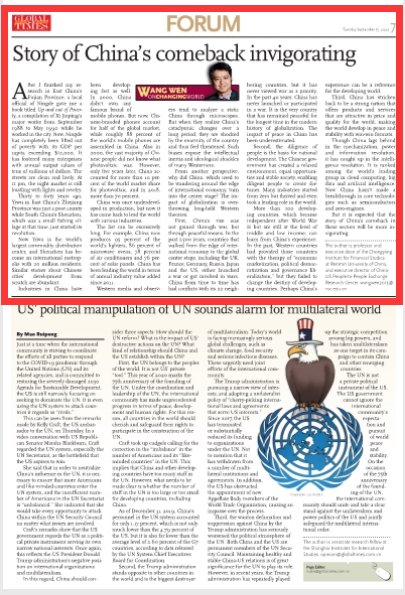Commentaries
Your Present Location: Teacher_Home> Wang Wen> CommentariesWang Wen:Story of China’s comeback invigorating
By Wang Wen Source: Global Times Published: 2020-09-14

After I finished my research in East China's Fujian Province, a local official of Ningde gave me a book titled Up and out of Poverty, a compilation of Xi Jinping's major works from September 1988 to May 1990 while he worked in the city. Now, Ningde has completely been lifted out of poverty with its GDP per capita exceeding $12,000. It has fostered many enterprises with annual output values of tens of millions of dollars. The streets are clean and lively. At 11 pm, the night market is still bustling with lights and revelry.
Thirty to forty years ago, Yiwu in East China's Zhejiang Province was just a poor county while South China's Shenzhen, which was a small fishing village at that time, just started its revolution. Now Yiwu is the world's largest commodity distribution center, and Shenzhen has become an international metropolis with 20 million residents. Similar stories about Chinese cities' development from scratch are abundant.
Industries in China have been developing fast as well. In 2000, China didn't own any famous brand of mobile phones. But now, Chinese-branded phones account for half of the global market, while roughly 88 percent of the world's mobile phones are assembled in China. Also in 2000, the vast majority of Chinese people did not know what photovoltaic was. However, only five years later, China accounted for more than 10 percent of the world market share for photovoltaic, and in 2018, more than 70 percent.
China was once underdeveloped in production, but now it has come back to lead the world with various industries. The list can be excessively long. For example, China now produces 95 percent of the world's lighters, 86 percent of microwave ovens, 78 percent of air conditioners and 76 percent of solar panels. China has been leading the world in terms of annual industry value added since 2011.
Western media and observers tend to analyze a static China through microscopes. But when they realize China's cataclysmic changes over a long period, they are shocked by the enormity of the country and thus feel threatened. Such biases expose the intellectual inertia and ideological shackles of many Westerners.
From another perspective, why did China, which used to be wandering around the edge of international economy, turn into the center stage? The impact of globalization is overthrowing long-held Western theories.
First, China's rise was not gained through war, but through peaceful means. In the past 1,500 years, countries that walked from the edge of international economy to the global center stage, including the UK, France, Germany, Russia, Japan and the US, either launched a war or got involved in wars. China from time to time has had conflicts with its 22 neighboring countries, but it has never viewed war as a priority. In the past 40 years, China has never launched or participated in a war. It is the very country that has remained peaceful for the longest time in the modern history of globalization. The impact of peace in China has been underestimated.
Second, the diligence of people is the basis for national development. The Chinese government has created a relaxed environment, equal opportunities and stable society, enabling diligent people to create fortunes. Many industries started from zero but thrived and even took a leading role in the world.
More than 100 developing countries, which became independent after World War II but are still at the level of middle and low income, can learn from China's experience. In the past, Western countries had provided those countries with the therapy of "economic marketization, political democratization and governance liberalization," but they failed to change the destiny of developing countries. Perhaps China's experience can be a reference for the developing world.
Third, China has stricken back to be a strong nation that offers products and services that are attractive in price and quality for the world, making the world develop in peace and stability with win-win formats.
Though China lags behind in the mechanization, power and information revolution, it has caught up in the intelligence revolution. It is ranked among the world's leading group in cloud computing, big data and artificial intelligence. Now China hasn't made a breakthrough in core technologies such as semiconductors and aero-engines. But it is expected that the story of China's comeback in these sectors will be more invigorating.
The author is professor and executive dean of the Chongyang Institute for Financial Studies at Renmin University of China, and executive director of China-US People-to-People Exchange Research Center. wangwen2013@ruc.edu.cn























































































 京公网安备 11010802037854号
京公网安备 11010802037854号





